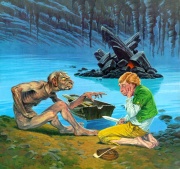I just have to pitch in because I've been bugged by this sentence for as long as I can remember.
From a purely statistical point of view, the sentence would appear to be nonsense. The ring had in fact been picked up by a hobbit before, but never by say a horse, making said class of creatures infinitely more unlikely (this is perhaps debatable, but stay with me). Even if we decide to exclude beasts, there's still any number of unlikely creatures, more so than a hobbit. My favorite is an ent - that's an unlikely creature to pick up the ring of power if you ask me, at the very least down by the roots of the Misty Mountains.
However, I finally got to the conclusion that we should look at the entire sentence as it stands and realize that it's not merely that a hobbit is unlikely to find it, given that the sway the ring could hold over a hobbit (and thus it's reason for attaching itself to one) is less than most other creatures (especially a goblin of which Misty Mountains are rife), but because it's also Bilbo.
Remember the line from The Hobbit:
[...] and people considered them [the Bagginses] very respectable, not only because most of them were rich, but also because they never had any adventures or did anything unexpected: you could tell what a Baggins would say on any question without the bother of asking him.
-- The Hobbit, emphasis mine.
So it's not only unlikely because he's a hobbit, but because he's a Baggins deep under Misty Mountains and because he's Bilbo, a sedentary individual with a penchant for smoking tobacco outside his, nice, homey hobbit hole and eating and drinking most all of the time. For such a creature, the chance of happening upon the ring of power is unlikely (but still not quite so much so as an ent).
Or, you know, you might go with the idea that perhaps not every sentence of Tolkien's has a completely established logic and coherence with his world, and just say it's a narrative mechanism to say "Woah, this is a bit weird, a hobbit, here?!".

